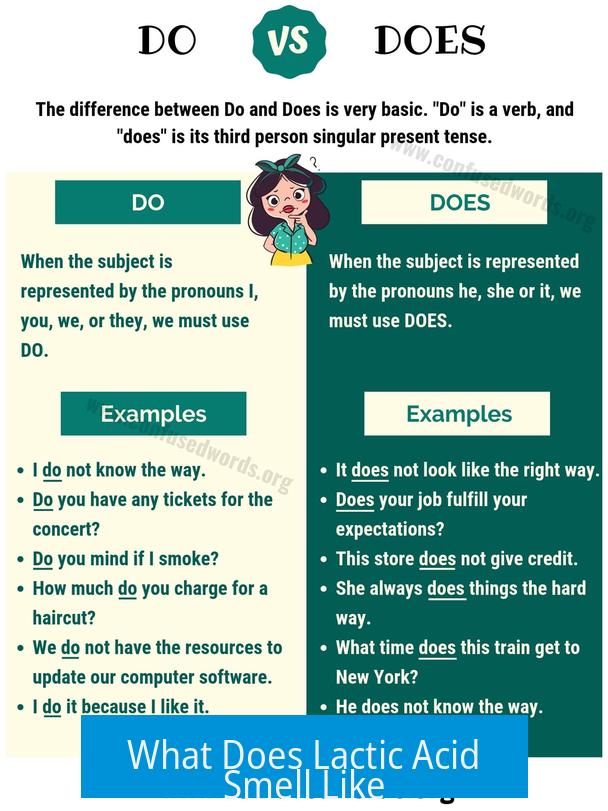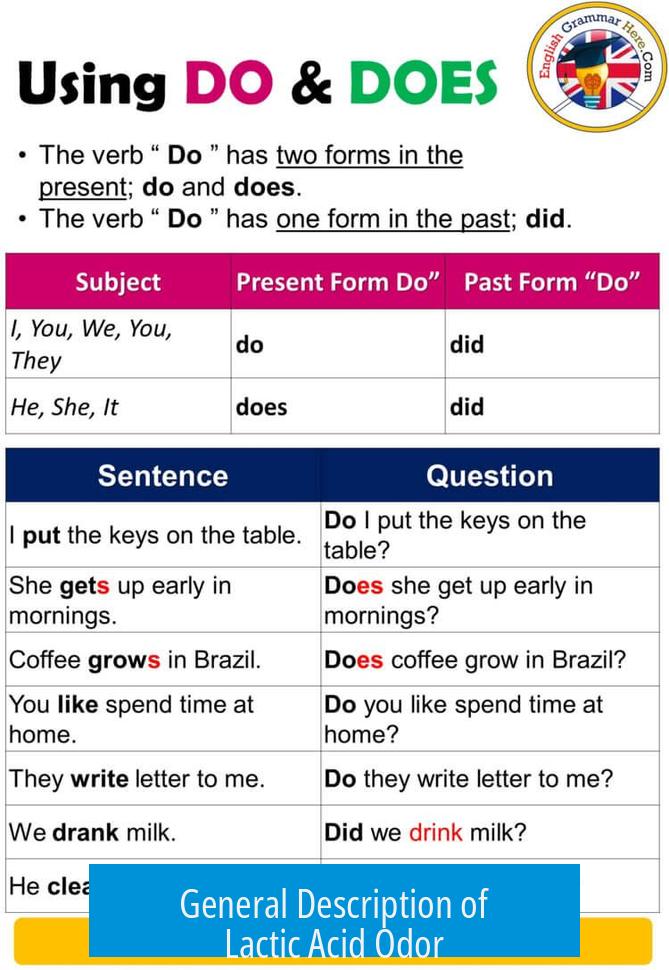What Does Lactic Acid Smell Like?

Lactic acid has little to no distinct smell; it is essentially odorless or faintly sour with a mild dairy-like note. This faint scent is often hard to detect and largely depends on the purity and concentration of the lactic acid sample.
General Description of Lactic Acid Odor

Pure lactic acid, especially in its liquid form, is effectively odorless. The sour taste is clear, but an accompanying smell is minimal or absent.
Why Lactic Acid Smells So Little

- Lactic acid has low volatility at room temperature. It does not easily evaporate, preventing molecules from reaching the nose.
- The molecule features an alpha hydroxyl group which forms strong hydrogen bonds, creating molecular ‘glue’. This reduces its tendency to evaporate compared to acids like propionic acid.
- This chemical property limits its ability to produce a noticeable airborne scent.
- Any smell detected around lactic acid is usually due to impurities, not lactic acid itself.
Comparison with Other Acidic or Fermentation Scents

While lactic acid is mild in smell, other fermentation byproducts like acetic acid emit stronger odors. For example, the sour, pungent smells of yogurt, cheese, or sweaty socks are often attributed to acetic acid and other compounds, not lactic acid.
Lactic acid contributes to the sourness of foods like sourdough bread, but it does not impart a strong aroma. Comparing fresh sourdough bread with regular bread may show sour flavor without a significant scent difference caused by lactic acid.
Summary of Key Points

- Lactic acid is odorless or has a faint sour, dairy-like smell.
- It is not volatile, so it rarely reaches the nose as a vapor.
- Strong smells from fermented foods often come from other acids, not lactic acid.
- Impurities can cause any perceivable smell associated with lactic acid samples.
Unmasking the Mystery: What Does Lactic Acid Smell Like?
Ever wondered what lactic acid smells like? If you’ve encountered words like “sour,” “acid,” or “fermentation” linked to lactic acid, you’re not alone. Grappling with chemical odors can be tricky, but here’s the scoop: lactic acid essentially has little to no smell. Surprised? Let’s break down the details.
First off, let’s talk about what lactic acid really is. It’s a naturally occurring organic acid important in biology, food, and industry. You know it as the culprit behind that burn when you push your muscles too hard or the tang in sourdough bread.
The Truth About Lactic Acid’s Scent
Those who work closely with lactic acid report it as having a very faint smell—if any at all. Some describe it as a mild dairy-like hint but so subtle that it might escape your nose completely. It essentially smells “lightly acidic,” lacking the pungent punch you might expect from an acid.
In fact, pure lactic acid is odorless. Think of it like a shy character who stays backstage. Why? It’s because lactic acid molecules love to stick together. Thanks to a molecular quirk called “hydrogen bonding” involving the alpha hydroxyl group, lactic acid molecules form strong bonds. This keeps them from floating around in the air, which means you’re unlikely to sniff them out. They’re not volatile enough to reach your nose.
Does Lactic Acid Smell Like Yogurt or Sour Milk?
Many confuse lactic acid with the sour smell of yogurt, cheese, or even the dreaded sweaty sock aroma. Here’s a fun fact: those odors mostly come from other acids and byproducts, especially acetic acid. So the tangy smell of yogurt is actually more vinegar-like, thanks to other fermentation chemicals, not lactic acid itself.
Imagine the sour zing in your favorite sourdough bread. Lactic acid is responsible for the sourness, but it doesn’t lend much of an aroma. Sourdough’s smell arises from a mix of fermentation compounds, so if you want to “smell” lactic acid in the wild, try fresh sourdough bread versus plain bread. The difference? More due to byproducts than lactic acid itself.
Why Don’t We Smell Lactic Acid More Often?
Here’s where chemistry saves the day—or at least explains the mystery. Lactic acid’s molecular “glue” prevents it from evaporating easily. Without evaporation, molecules just don’t float into the air and reach your olfactory receptors. You could say lactic acid is “anti-volatility.”
Compare it to other acids like propionic acid, which has much higher volatility. Propionic acid’s molecules can escape into the air, bringing along their characteristic pungent smell. Lactic acid stays put, keeping its scent on the down-low.
If you do catch a smell linked to lactic acid, it’s often impurities or contaminants causing it. So perhaps your lactic acid is just shy, or it’s hanging out with some obnoxious neighbors!
The Muscle Connection: Why You Can Smell Lactic Acid After a Workout (Or Not!)
Fun fact: lactic acid builds up in your muscles during intense exercise, causing soreness and fatigue. But don’t expect a whiff of it after your workout. Lactic acid’s role in muscle soreness is purely biochemical and unrelated to any smell. Your sweaty gym shirt might smell otherwise, but that odor comes from bacteria breaking down sweat, not the lactic acid.
Is Lactic Acid’s Smell Ever Useful?
Since lactic acid itself doesn’t have a notable smell, it’s not a useful marker by scent alone. But understanding its subtlety helps chemists and food scientists focus on other aroma compounds when assessing fermentation quality or spoilage. It’s like knowing the silent partner in a duo—important but not the one stealing the spotlight.
Practical Tips to Experience Lactic Acid’s Effects (Without the Smell)
- Try a sourdough bread tasting session comparing fresh sourdough to plain bread. Notice the tang linked to lactic acid’s presence.
- In skincare, products with lactic acid have minimal odor but provide gentle exfoliation. That faint “acidic” sensation comes from the acid’s function, not a strong smell.
- Next time after a tough workout, remember the soreness is lactic acid buildup, but the “smell of effort” is something else entirely.
Final Thoughts: Lactic Acid Is Quiet in the Nose but Loud in Action
In a nutshell, lactic acid plays many roles—from food fermentation to muscle metabolism—but it keeps its scent discreet. Its lack of volatility silences its aroma, making it more of a flavor and biochemical powerhouse than a source of smell.
So the next time you chew on sourdough or feel the burn after lunges, give a nod to lactic acid—the silent sour hero that doesn’t stink up your day.
“If lactic acid was a person, it would be the quiet but strong type—no loud voice, just impactful presence.”
What does pure lactic acid smell like?
Pure lactic acid is odorless. It does not have a noticeable smell because it does not evaporate easily at room temperature.
Why is lactic acid’s smell so faint compared to other acids?
Lactic acid molecules bond strongly to each other, making it less volatile. This prevents it from releasing a strong scent that you can detect.
Does lactic acid smell like sourdough bread?
Lactic acid contributes to the sour taste in sourdough bread, but it doesn’t have a strong smell itself. The sourdough scent comes from other fermentation compounds.
Can the smell associated with lactic acid be from impurities?
Yes. Any faint smell near lactic acid is likely from impurities or other substances mixed with it, not the lactic acid itself.
How does lactic acid’s smell compare to acetic acid?
Acetic acid has a sharp vinegar-like smell, while lactic acid has almost no scent and tastes simply sour without a strong odor.





Leave a Comment